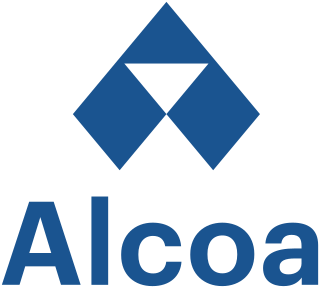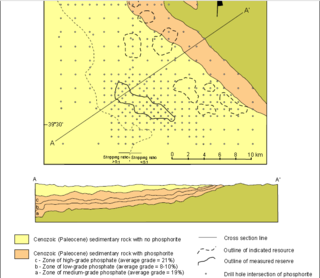
Transport in Saudi Arabia is facilitated through a relatively young system of roads, railways and seaways. Most of the network started construction after the discovery of oil in the Eastern Province in 1952, with the notable exception of Highway 40, which was built to connect the capital Riyadh to the economically productive Eastern Province, and later to the Islamic holy city of Mecca and the port city of Jeddah. With the economic growth of the 1970s, the Kingdom of Saudi Arabia has initiated many infrastructure development projects across the country, and the extensive development of the transportation network has followed suit in support of various economic developments.
Rio Tinto Alcan is a Canada-based mining company. Headquartered in Montreal, Quebec, it is a subsidiary of global mining conglomerate Rio Tinto. It was created on 15 November 2007 as the result of the merger between Rio Tinto's Canadian subsidiary and Canadian company Alcan.

Alcoa Corporation is a Pittsburgh-based industrial corporation. It is the world's eighth-largest producer of aluminum. Alcoa conducts operations in 10 countries. Alcoa is a major producer of primary aluminum, fabricated aluminum, and alumina combined, through its active and growing participation in all major aspects of the industry: technology, mining, refining, smelting, fabricating, and recycling.

WMC Resources Limited was an Australian diversified mining company.
Alumina Limited is an Australian holding company. Spun off from Western Mining Corporation in 2002, its sole asset is a 40% shareholding in Alcoa World Alumina & Chemicals. In 2024, Alcoa acquired Alumina for US$2.2 billion.

Jizan, also spelled Jazan, Gizan or Gazan, is a port city and the capital of Jizan Region, which lies in the southwest corner of Saudi Arabia. Jizan City is situated on the coast of the Red Sea and serves a large agricultural heartland that has a population of 173,919 as of 2022 and over 1.4 million, in the whole Jizan region. As the city is the capital of the region, it has the regional airport as well as the Jizan seaport. The area is noted for its high-quality production of fruits such as mangoes, figs, papayas, plums, and coffee.
Alcoa World Alumina and Chemicals is a joint venture between Alumina Limited and Alcoa and is abbreviated to AWAC. AWAC's business is the mining of bauxite, the extraction of alumina and the smelting of aluminium. It has about 25% of the global alumina market. Alcoa acts as the day-to-day manager.
The Al Muhaidib Group is an international private group of companies based in Saudi Arabia that was founded in 1946 by Abdul Kadir bin Abdul Muhsin Al-Muhaidib. The current chairman of the board of directors is Sulaiman A. K. Al-Muhaidib.
Kaiser Aluminum Corporation is an American aluminum producer. It is a spinoff from Kaiser Aluminum and Chemicals Corporation, which came to be when common stock was offered in Permanente Metals Corporation and Permanente Metals Corporation's name was changed to Kaiser Aluminum and Chemicals Corporation.
Aluminium in Africa originates from bauxite, and within Africa is primarily found in Guinea, Mozambique and Ghana. Guinea is by far the biggest producer in Africa, and is a world leader in bauxite production.

United Company RUSAL, international public joint-stock company is the world's second largest aluminium company by primary production output. It was the largest until overtaken by China Hongqiao Group in 2015. UC RUSAL accounts for almost 9% of the world's primary aluminium output and 9% of the world's alumina production.

Volta Aluminum Company, known as VALCO, is an aluminium company based in Tema, Greater Accra Region founded by Kaiser Aluminum and now wholly owned by the government of Ghana.

Aluminium smelting is the process of extracting aluminium from its oxide, alumina, generally by the Hall-Héroult process. Alumina is extracted from the ore bauxite by means of the Bayer process at an alumina refinery.

Water supply and sanitation in Saudi Arabia is characterized by challenges and achievements. One of the main challenges is water scarcity. In order to overcome water scarcity, substantial investments have been undertaken in seawater desalination, water distribution, sewerage and wastewater treatment. Today about 50% of drinking water comes from desalination, 40% from the mining of non-renewable groundwater and only 10% from surface water in the mountainous southwest of the country. The capital Riyadh, located in the heart of the country, is supplied with desalinated water pumped from the Persian Gulf over a distance of 467 km. Water is provided almost for free to residential users. Despite improvements, service quality remains poor, for example in terms of continuity of supply. Another challenge is weak institutional capacity and governance, reflecting general characteristics of the public sector in Saudi Arabia. Among the achievements is a significant increases in desalination, and in access to water, the expansion of wastewater treatment, as well as the use of treated effluent for the irrigation of urban green spaces, and for agriculture.

The Mining industry of Ghana accounts for 5% of the country's GDP and minerals make up 37% of total exports. Gold contributes over 90% of the total mineral exports. Thus, the main focus of Ghana's mining and minerals development industry remains focused on gold. Ghana is Africa's largest gold producer, producing 80.5 t in 2008. Ghana is also a major producer of bauxite, manganese and diamonds. Ghana has 20 large-scale mining companies producing gold, diamonds, bauxite and manganese; over 300 registered small scale mining groups; and 90 mine support service companies. Other mineral commodities produced in the country are natural gas, petroleum, salt, and silver.
The second-largest mineral industry in the world is the mineral industry of Africa, which implies large quantities of resources due to Africa being the second largest continent, with 30.37 million square kilometres of land.With a population of 1.4 billion living there, mineral exploration and production constitute significant parts of their economies for many African countries and remain keys to economic growth. Africa is richly endowed with mineral reserves and ranks first in quantity of world reserves for bauxite, cobalt, industrial diamond, phosphate rock, platinum-group metals (PGM), vermiculite, and zirconium.

Jalamid(Arabic: حزم الجلاميد) is a town and crossroads in Saudi Arabia near the Iraqi border.
Ras Al-Khair is a town and port currently under development in the Eastern Province of Saudi Arabia. It is on the eastern coast, 60 km (37 mi) north of Jubail. It is also known under its project name of "Minerals Industrial City".

The SAR North–South Railway line is a 2,750 km network of railway lines in central and eastern Saudi Arabia, built and operated by the Saudi Railway Company. The primary line of the network connects the capital of the kingdom, Riyadh, to the border with Jordan at Al Hadithah.
The Ras Al-Khair Power and Desalination Plant is a power and desalination plant located in Ras Al-Khair on the eastern coast of Saudi Arabia. It is operated by the Saline Water Conversion Corporation of Saudi Arabia. The plant began operating in April 2014 and, as of January 2017, is the world's largest hybrid water desalination plant. The project includes a power plant capable of producing 2400 MW of electricity. In 2015, it won the Global Water Awards "Desalination Plant of the Year" award.











